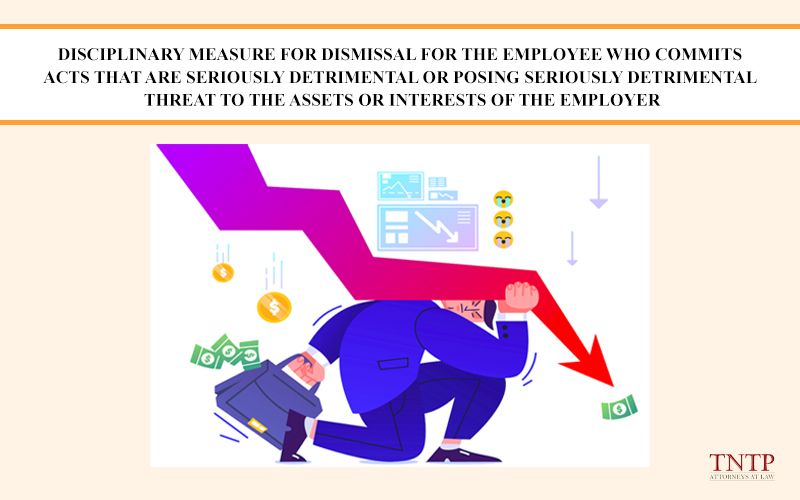Disciplinary measure for dismissal for the employee who commits acts that are seriously detrimental or posing seriously detrimental threat to the assets or interests of the employer

In the previous two sections, TNTP analyzed 02 cases in which employers can apply the form of dismissal discipline to employees, specifically: employees who commit acts of theft, embezzlement, gambling, intentionally causing injury, drug use in the workplace, and employees who disclose business secrets, technology secrets, infringing on the intellectual property rights of employers. In this article, we will continue to discuss the case of employees who are disciplined for dismissal when committing acts that cause serious damage or threaten to cause particularly serious damage to the assets and interests of employers.
2. Cases where employers are subject to the form of disciplining labor dismissal
2.3 Employees who commit acts of causing serious damage or threatening to cause particularly serious damage to assets and interests of employers
Article 125 of the Labor Code 2019 provides for two acts that may cause employees to be disciplined in the form of dismissal, namely (i) acts causing serious damage to assets and interests of employers and (ii) acts has not caused actual damage but is likely to cause particularly serious damage to assets and interests of employers.
Currently, the Labor Code 2019 does not specify the acts considered to cause serious damage and threaten to cause particularly serious damage to the assets and interests of employers. Therefore, employers should prescribe these acts in the internal labor regulation to have grounds for handling violations of employees. The act of “threatening to cause particularly serious damage to the assets and interests of employers” is understood as an act that has not yet caused actual damage but has the potential to cause particularly serious damage to the assets and interests of employers. For example, employees have smoking behavior in warehouses containing garments, discharging water leading to flooding in the warehouse of electronic components products,…
To handle the dismissal discipline for the employee, the employer needs to base on the extent of the damage of the employee’s violation. The Labor Code 2019 does not specify the extent of damage when it is considered serious and especially serious, so the determination of the extent of damage should be based on the labor regulation. Depending on the characteristics of the enterprise, business model, and business lines, each enterprise determines the level of “serious damage”, and “especially serious damage” differently.
However, enterprises need to specify the level of serious damage, especially serious damage in accordance with reality because, for the labor regulation to take effect, the labor regulation should be approved by the Department of Labor, Invalids, and Social Affairs in the locality. Moreover, if there is a dispute between employees and businesses about this dismissal and the dispute is settled in court, each party must
prove its claim. At this time, the employer cannot only rely on the provisions of the labor regulation, which should be based on the conformity between labor regulation, legal regulations, and real-life practices.
According to the guidance of local labor authorities and the view of adjudicating labor dispute cases in court, the determination of the extent of serious damage is usually understood as from 10 months’ region-based minimum wage or more applied at the place where the employee works. This is an indirect inference from the provisions on material responsibility in Article 129 of the Labor Code 2019. Accordingly, if the employee causes “non-serious damage” due to negligence with a value of no more than 10 months’ region-based minimum wage announced by the Government applied at the place where the employee works, the employee must pay as much as 03 months of salary.
Thus, enterprises may stipulate serious harms valued at more than 10 months’ region-based minimum wage announced by the Government applied at the place where employees work; ii) particularly serious damages valued at more than 15 months of 10 months’ region-based minimum wage announced by the Government applied at the place where employees work.
Regarding the monthly region-based minimum wage, Decree No. 38/2022/ND-CP stipulates that from July 1, 2022, the monthly region-based minimum wage shall be implemented as follows: Zone I is VND 4,680,000/month; Zone II is VND 4,160,000/month; Zone III is VND 3,640,000 per month; Zone IV 3,250,000 VND/month. For example, for enterprises operating in the area of Zone I, the damage is considered serious when more than VND 46,800,000, and the damage is considered especially serious when more than VND 70,200,000.
Thus, when handling disciplinary dismissal of employees in case the employee commits acts of causing serious damage or threatening to cause serious damage to the assets, the interests of the employer should ensure: (i) The employee commits acts causing serious damage or threatening to cause particularly serious damage to assets and interests of employers; (ii) The labor regulation specifies the extent to which serious damages and particularly serious damages are determined; (iii) The labor regulation stipulates acts deemed to cause serious damage or threaten to cause particularly serious damage to assets and interests of employers; (iv) The employer can prove the employee’s violation.
The above is the third case in which employers can base to handle labor discipline in the form of layoffs for employees. I hope the article helps readers. We will continue to analyze the cases of employers applying the dismissal to employees in the next articles.
Best regards,
- For additional information and the newest articles from TNTP and Associates International Law Firm, please join our Facebook Fanpages at:
- Please click on the following link to learn more about legal knowledge:
https://dsdc.com.vn/en/category/legal-newsletter/
- Please click on the following links to learn more about the legal services of TNTP and Associates International Law Firm:
- Dispute resolution services: https://dsdc.com.vn/en/the-dispute-resolution-services-from-tntp-law-firm/
- Legal consulting services: https://dsdc.com.vn/en/legal-consulting-services-from-tntp/
- Debt collection services: https://dsdc.com.vn/en/debt-collection-services-from-tntp/
- For additional information, please contact us at:
TNTP and Associates International Law Firm
Lawyer Nguyen Thanh Ha
Phone: 0931 798 818
Email: ha.nguyen@tntplaw.com



